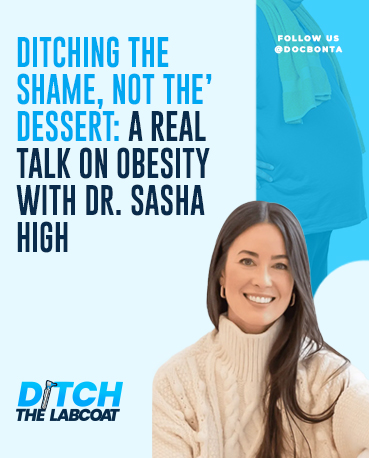There’s something uniquely humbling about standing in line at a Caribbean buffet with four kids in tow, trying to convince yourself that this time you’ll skip dessert. I recently found myself doing exactly that — only to overhear a heated exchange between a couple ahead of me. A man, who was clearly living with obesity, was being chastised by his partner: “Why can’t you just eat less?” It was awkward. It was raw. And it was the perfect reminder of how much misunderstanding still exists around obesity.
That moment stayed with me. Not just because of the desserts I still ended up eating (every day for 12 days, thanks), but because it led me into one of the most enlightening conversations, I’ve had on Ditch the Labcoat — this time with Dr. Sasha High, an internist and recognized expert in obesity medicine.
Why Can’t You Just Eat Less?
Sasha and I dove deep into that question. And spoiler: it’s the wrong question.
Obesity isn’t about a lack of willpower. It’s about biology, environment, psychology, and the ancient mesolimbic reward system in our brains that helped our ancestors survive — but now gets hijacked by ultra-processed, hyper-palatable foods. As Sasha put it, “It’s not about knowing what to do — most people know that. It’s about the mental tools needed to do it, especially when life gets stressful.”
You can’t outwill a system that’s rigged against you.
It’s Not Willpower. It’s Wiring.
Dr. High broke down the science: when people with obesity lose weight, hormones like leptin drop — and the body fights back, interpreting fat loss as a threat to survival. Hunger increases. Cravings intensify. It’s not weakness. It’s physiology.
So when we, as physicians, toss out a diet pamphlet or tell patients to “just eat clean,” we’re missing the point — and frankly, missing the opportunity to help.
B+ Consistency > A+ Perfection
This was one of my favorite takeaways: the idea of the next best choice. You ate three Oreos? Fine. Make your next meal protein-forward and nutrient-rich. Don’t wait until Monday to “start again.” No shame spirals. No all-or-nothing. Just real, practical cognitive behavioural strategies — the kind that Sasha teaches her patients every day.
It’s also why she says things like food prep matters. Visibility matters. What you bring into your house matters. It’s less about the apple vs. the pie and more about setting up your environment to make the healthier choice easier. (Note to self: keep the Cheetos out of the pantry.)
The Truth About GLP-1 Meds
We didn’t shy away from the big topic: medications like Ozempic. Are they a cure? No. But they are powerful tools in the right context — especially when lifestyle interventions alone aren’t enough to address the medical consequences of excess adiposity.
Sasha’s perspective was refreshingly grounded: the meds help, but they aren’t magic. They need to be paired with sustainable, values-driven lifestyle strategies. Not rigid diets. Not shame. And not the fantasy that one day we’ll all just naturally prefer quinoa to curly fries.
Reframing the Conversation
There was something profoundly validating about this episode. As someone who tries to balance a busy medical practice, a house full of kids, a podcast, and the occasional “Mac attack” — I could relate. So can our patients. That’s why this conversation needs to move beyond nutrition labels and step counters. We need to talk about:
- Emotional eating and the need for real stress-management strategies
- The affordability and availability of healthy food
- How to navigate a food system that’s working against our health
- Why a B+ effort over time beats a two-week sprint of clean eating followed by a crash
Check out Dr. Jeff Alfonsi’s episode on What’s REALLY in our food?
Final Thoughts
Dr. Sasha High doesn’t just know the science — she has a gift for meeting people where they are. Her blend of empathy, realism, and clinical expertise is exactly what the field of obesity medicine needs more of.
And if there’s one thing I hope you take from our chat, it’s this: obesity is not a personal failure. It’s a chronic, relapsing condition influenced by forces far beyond what’s on your plate. But with the right tools, mindset, and support — it can be managed.
So the next time you reach for dessert (or avoid it entirely), just remember it’s not about being perfect. It’s about being intentional.
And maybe — just maybe — making your next best choice.
🎧 Listen to the full episode with Dr. Sasha High on the Ditch the Labcoat Podcast.
It’s one you don’t want to miss.
You can also catch Dr. Sean Wharton as he challenges conventional thinking on obesity. In this enlightening episode of Ditch the Labcoat Podcast, we explore how genetics, health, and medication intersect to reshape our understanding of obesity.

